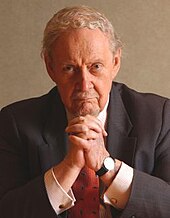Robert Bork (lawyer)
Robert Heron Bork (born March 1, 1927 in Pittsburgh , Pennsylvania , † December 19, 2012 in Arlington County , Virginia ) was an American lawyer and United States Solicitor General .
biography
The son of a sales representative from the steel industry and a teacher did his military service in the US Marine Corps (USMC) between 1945 and 1946 after attending the Hotchkiss School in Connecticut and then studied at the University of Chicago , where he received a Bachelor of Arts ( BA). He then completed postgraduate studies at the University of Chicago and completed this in 1953 with a Juris Doctor (JD). During his student days he joined the Phi Delta Phi legal connectionsand Phi Beta Kappa . In the meantime he served in the USMC's reserves during the Korean War from 1950 to 1952 . He then worked as a lawyer .
In June 1973 he was appointed Solicitor General by US President Richard Nixon , taking third place in the United States Department of Justice as the successor to Erwin Griswold . In this capacity he played a decisive role during the Watergate Affair when he dismissed the state special investigator Archibald Cox as part of the so-called Saturday Night Massacre on the orders of the President on October 20, 1973, after Justice Secretary Elliot L. Richardson and Vice Justice Minister (Deputy Attorney General) William Ruckelshaus refused and resigned. Bork himself was then acting Attorney General for a short period from October 20 to December 17, 1973 . Bork held the office of Solicitor General until the end of Gerald Ford's presidency in January 1977.
In 1982 he became a judge on the for the District of Columbia competent US Court of Appeals appointed. He was a member of this Federal Court of Appeals until 1988.
In 1987 Republican Bork was nominated by President Ronald Reagan as a candidate for Associate Justice at the US Supreme Court . However, this nomination ultimately failed because of his strongly conservative stance due to rejection in the US Senate .
A left-wing liberal campaign against Bork's nomination (the most influential affiliated organizations were Planned Parenthood , the AFL-CIO , NARAL , the NAACP and People For the American Way ) led to the coining of a new verb in American English: to bork someone means, according to Oxford English Dictionary , to systematically defame or denigrate a person in order to damage their (public) career.
There was resistance to Bork within the Republican Party, particularly from Senator Arlen Specter , a long-time Republican member of the Judiciary Committee. On October 23, 1987, the United States Senate finally voted 58-42 against Bork's nomination. Instead of Bork, Anthony Kennedy was nominated as associate judge and appointed Associate Justice of the Supreme Court on February 18, 1988 .
Bork, who converted to Catholicism in 2003 , was also involved in several associations and organizations and was a member of the advisory board of the Texas Review of Law & Politics and the Defenders of Property Rights . He was also a member of the Political Board of the American Civil Rights Union and a board member of Restoring the American Dream .
Bork died in December 2012 at the age of 85.
Publications
Bork was also the author of several books on legal and political subjects. His major publications include:
- The Tempting of America: The Political Seduction of the Law , Simon & Schuster , 1991
- Slouching Toward Gomorrah: Modern Liberalism and American Decline , HarperCollins , 1996
- Coercing Virtue: The Worldwide Rule of Judges , American Enterprise Institute , 2003
Individual evidence
- ↑ a b c d Ethan Bronner: A Conservative Whose Supreme Court Bid Set the Senate Afire. In: The New York Times . December 19, 2012, accessed January 4, 2013 .
- ↑ Joseph Michael Green: Your Past and the Press! Controversial Presidential Appointments: A Study Focusing on the Impact of Interest Groups and Media Activity on the Appointment Process . University Press of America, Lanham, Maryland et al. a. 2004, p. 95.
- ^ Oxford Dictionaries: Definition of bork
Web links
- Official CV from the Ministry of Justice aks Solicitor General (English)
- Robert Bork in nndb (English)
| personal data | |
|---|---|
| SURNAME | Bork, Robert |
| ALTERNATIVE NAMES | Bork, Robert Heron (full name) |
| BRIEF DESCRIPTION | American lawyer, judge, and United States Solicitor General |
| DATE OF BIRTH | March 1, 1927 |
| PLACE OF BIRTH | Pittsburgh , Pennsylvania |
| DATE OF DEATH | December 19, 2012 |
| Place of death | Arlington County |

